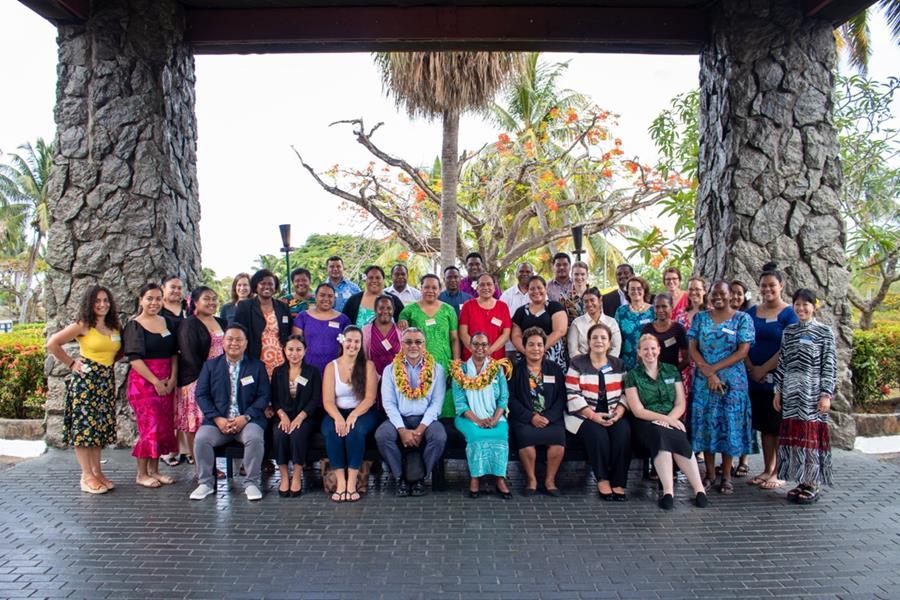Communication experts from American Samoa, Cook Islands, Fiji, French Polynesia, Marshall Islands, Nauru, New Caledonia, Niue, Northern Mariana Islands, Palau, Samoa, Solomon Islands, Tokelau, Tonga, Tuvalu, and Vanuatu come together for the Pacific Risk Communication Workshop, held in Nadi, Fiji from 7-10 November 2023. The workshop was jointly organized by the World Health Organization (WHO) and the Pacific Community (SPC).
Photo: WHO/Faizza Tanggol
Experts from 15 Pacific island countries and areas gathered this week to strengthen communication and engagement with communities during emergencies. The Pacific Risk Communication and Community Engagement (RCCE) Workshop took place in Nadi, Fiji, from 7-10 November and was jointly organized by the World Health Organization (WHO) and the Pacific Community (SPC).
As Pacific nations cope with ongoing challenges posed by various health threats – from disease outbreaks to the impacts of climate change – the workshop aimed to boost capacities to better listen to, engage and inform Pacific peoples and communities. The countries also agreed to launch a revitalized Pacific Risk Communication and Community Engagement Network – a platform for country focal points to exchange views, resources, and support peer-to-peer learning.
“COVID-19 reminded us all that the success of any emergency response relies on close collaboration with people and communities,” said WHO Representative to the South Pacific and Director of Pacific Technical Support, Dr Mark Jacobs. “Effective communication with, and understanding of, our communities in the face of public health threats is an absolute necessity.”
Fiji’s Permanent Secretary of Health, Dr James Fong, agreed: “Health authorities need to listen to their people, understand how they feel and think, and empower them to play their part in protecting their health and the health of others during crises – whether that’s an outbreak, pandemic or cyclone.”
The importance of risk communication has long been recognized, with the field included as one of the core capacities under the International Health Regulations (2005), a legally binding framework that defines countries’ rights and obligations in handling public health events and emergencies. Yet countries worldwide, including in the Pacific, have faced challenges in communicating risks and science to the public, especially during emergencies when emotions can run high. This has been exacerbated by the rising spread of misinformation and disinformation on social media which has led many people to question who or what to believe. In the first three months of the COVID-19 pandemic, for example, nearly 6,000 people around the globe were hospitalized because of COVID-19 misinformation.
“Communicating accurate information in a timely manner, to all those at risk, is critical during health emergencies and disasters”, said SPC’s Director of the Public Health Division, Dr Berlin Kafoa. “It is very timely to reinforce risk communication capacity and preparedness using the lessons learned from the COVID-19 pandemic to improve the health security of our Pacific communities”.
Detailed discussions during the workshop focused on topics such as how to plan in advance to communicate about different kinds of emergencies, how to coordinate with colleagues and partners, and how to gather feedback from the public. As the communication and emergency experts return to their home countries, they will take with them the knowledge to enhance the application of risk communication.
“The way we communicate can make a difference between calm and chaos, clarity and confusion, safety and harm,” added Dr Jacobs. “Our words and actions have the power to shape the resilience of our communities, and this workshop in Fiji is a right step towards the direction of better informed and engaged people, and ultimately, a healthier and safer Pacific.”
The workshop was made possible with financial support from the Government of Germany, European Union, and Asian Development Bank.
Photos from the workshop may be downloaded here.
Useful links:
- Fighting misinformation in the time of COVID-19, one click at a time
- Region’s health leaders agree on actions to enhance communication for health, strengthen and transform the health workforce, and leverage innovation for health impact
Media Contacts:
Lauren O’Connor, Technical Officer for Communications, Resource Mobilization & External Relations, WHO Division of Pacific Technical Support | +679 777 9733 or [email protected]
Evlyn Mani, Communications Officer, Public Health Division, Pacific Community (SPC) |+679 8010768 or [email protected]. For general media inquiries, please contact [email protected].
About WHO: The World Health Organization (WHO) is the United Nation’s specialized agency for international public health. In the Pacific, WHO’s Division of Pacific Technical Support (DPS) provides tailored, timely support to 21 Pacific island countries and areas. Our main office is in Suva, Fiji, and the Division has six other offices across the region: The Federated States of Micronesia, Kiribati, Samoa, Solomon Islands, Tonga and Vanuatu. www.who.int
About SPC:
The Pacific Community has been supporting sustainable development in the Pacific, through science, knowledge and innovation since 1947. It is the principal intergovernmental organisation in the region, owned and governed by its 27 member countries and territories. www.spc.int
Follow SPC News | Facebook | Twitter | LinkedIn | Instagram | YouTube and subscribe to SPC's Newsletter
